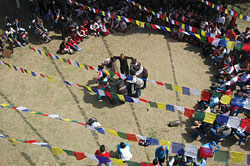|
|
There are now barely six weeks left until the constituent assembly election scheduled for 10 April, but barely 67 percent of people have heard of it and only 21 percent actually understand what it is and how it will work. (See 'Pre-poll poll', #386) Despite the efforts of the political parties, the media and international groups, understanding of the key political issues facing the country is still low in many areas.
Now, stage actors are trying to address this by organising a nation-wide election awareness raising campaign. Nepalis will be voting for the first time since 1999, and for millions of young people it will be their first chance to vote.
The campaign is being spearheaded by the drama collective Aarohan Gurukul, whose recent production Ghanachakkar has been regularly packed in Kathmandu, and also went on tour to Delhi and Kolkota.
They plan to raise awareness about the elections mainly in districts where access to media is limited, and many people are still illiterate and unable to read election literature. To present the issues to these people they plan to use the medium of street theatre.
Over the last few weeks, members of Gurukul's 14 regional pods have been gathered at Purano Baneswor. Each local group has sent two representatives, and they have come from all parts of the country, from Humla to Jhapa. In the evening time the canteen was rowdy, ringing with the tones of different accents from all over Nepal.
The young actors are here to receive special training for the information campaign. This includes detailed instruction about the election process, the constituent assembly and its workings, and on participatory street theatre techniques.
The street plays will have no script but will be a 45-minute improvisation, according to a plan based around the major issues of how to vote and what voting means. They will be interactive, allowing the audience to even join in the play in its later stages.
"Each performance will be followed by a discussion about the issues covered in a play," says Sunil Pokharel, Gurukul's artistic director, "the discussions should be longer than the play itself.
When the local group members return home, using this plan as their starting point they will each develop a play with their own group, tailored to the environment of each place.
The plays will feature locally-specific issues, use local props, and where appropriate local languages, including Maithili, Tharu, Bhojpuri, Awadhi, Tamang and Limbu. All of these aspects are intended to make the plays as relevant and engaging as possible to the public in each area.
Gurukul member Prabin Khatiwada explains: "We won't just go to the district capitals, because people there are usually quite aware anyway. We will tour the villages, as this is where the people really need this information."
Gurukul themselves plan to perform in Kathmandu, Lalitpur, Bhaktapur, Sindhupalchok, Kabhre, Nuwakot and Rasuwa, and together all the local groups hope to cover 42 districts of the country. Still more districts will be covered by two other drama groups Sarwanam and Kusum, both partners of Gurukul. In total the three collectives and their regional groups hope to reach 73 out of 75 districts in Nepal.
"Lots of people are confused about the difference between the constituent assembly election and the parliamentary election. The people in the villages need to understand how the elections actually work," says Sunil.
When asked about what made him take up this campaign, Sunil replies: "This is an important moment for the new Nepal, and it is our duty as artists to contribute."



